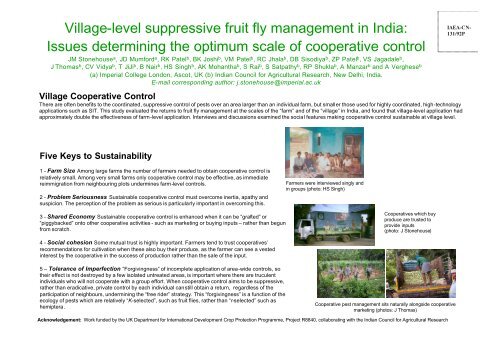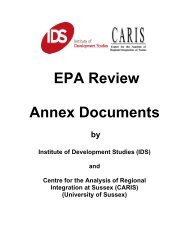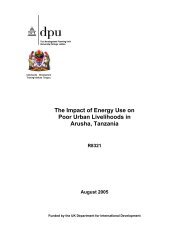“Key Informant Survey” of Production, Value, Losses and ... - DfID
“Key Informant Survey” of Production, Value, Losses and ... - DfID
“Key Informant Survey” of Production, Value, Losses and ... - DfID
You also want an ePaper? Increase the reach of your titles
YUMPU automatically turns print PDFs into web optimized ePapers that Google loves.
Village-level suppressive fruit fly management in India:<br />
Issues determining the optimum scale <strong>of</strong> cooperative control<br />
JM Stonehouse a , JD Mumford a , RK Patel b , BK Joshi b , VM Patel b , RC Jhala b , DB Sisodiya b , ZP Patel b , VS Jagadale b ,<br />
J Thomas b , CV Vidya b , T JiJi b , B Nair b , HS Singh b , AK Mohantha b , S Rai b , S Satpathy b , RP Shukla b , A Manzar b <strong>and</strong> A Verghese b<br />
(a) Imperial College London, Ascot, UK (b) Indian Council for Agricultural Research, New Delhi, India.<br />
E-mail corresponding author: j.stonehouse@imperial.ac.uk<br />
Village Cooperative Control<br />
There are <strong>of</strong>ten benefits to the coordinated, suppressive control <strong>of</strong> pests over an area larger than an individual farm, but smaller those used for highly coordinated, high-technology<br />
applications such as SIT. This study evaluated the returns to fruit fly management at the scales <strong>of</strong> the “farm” <strong>and</strong> <strong>of</strong> the “village” in India, <strong>and</strong> found that village-level application had<br />
approximately double the effectiveness <strong>of</strong> farm-level application. Interviews <strong>and</strong> discussions examined the social features making cooperative control sustainable at village level.<br />
Five Keys to Sustainability<br />
1 - Farm Size Among large farms the number <strong>of</strong> farmers needed to obtain cooperative control is<br />
relatively small. Among very small farms only cooperative control may be effective, as immediate<br />
reimmigration from neighbouring plots undermines farm-level controls.<br />
2 - Problem Seriousness Sustainable cooperative control must overcome inertia, apathy <strong>and</strong><br />
suspicion. The perception <strong>of</strong> the problem as serious is particularly important in overcoming this.<br />
3 - Shared Economy Sustainable cooperative control is enhanced when it can be “grafted” or<br />
“piggybacked” onto other cooperative activities - such as marketing or buying inputs – rather than begun<br />
from scratch.<br />
4 - Social cohesion Some mutual trust is highly important. Farmers tend to trust cooperatives’<br />
recommendations for cultivation when these also buy their produce, as the farmer can see a vested<br />
interest by the cooperative in the success <strong>of</strong> production rather than the sale <strong>of</strong> the input.<br />
5 – Tolerance <strong>of</strong> Imperfection “Forgivingness” <strong>of</strong> incomplete application <strong>of</strong> area-wide controls, so<br />
their effect is not destroyed by a few isolated untreated areas, is important where there are truculent<br />
individuals who will not cooperate with a group effort. When cooperative control aims to be suppressive,<br />
rather than eradicative, private control by each individual can still obtain a return, regardless <strong>of</strong> the<br />
participation <strong>of</strong> neighbours, undermining the “free rider” strategy. This “forgivingness” is a function <strong>of</strong> the<br />
ecology <strong>of</strong> pests which are relatively “K-selected”, such as fruit flies, rather than “r-selected” such as<br />
hemiptera.<br />
Farmers were interviewed singly <strong>and</strong><br />
in groups (photo: HS Singh)<br />
Cooperatives which buy<br />
produce are trusted to<br />
provide inputs<br />
(photo: J Stonehouse)<br />
Cooperative pest management sits naturally alongside cooperative<br />
marketing (photos: J Thomas)<br />
Acknowledgement: Work funded by the UK Department for International Development Crop Protection Programme, Project R8840, collaborating with the Indian Council for Agricultural Research<br />
IAEA-CN-<br />
131/92P

















